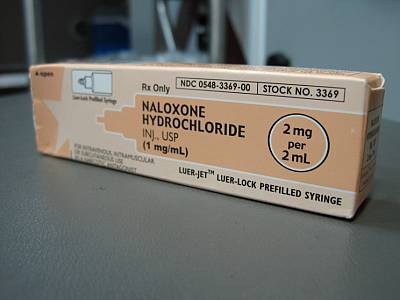Surgeon General Advises Greater Use of Naloxone to Help Save Lives
Surgeon General Adams says "Research shows that when naloxone and overdose education are available to community members, overdose deaths decrease in those communities."
U.S. Surgeon General Jerome Adams issued a rare (first since 2005) "national advisory" yesterday that said "For patients currently taking high doses of opioids as prescribed for pain, individuals misusing prescription opioids, individuals using illicit opioids such as heroin or fentanyl, health care practitioners, family and friends of people who have an opioid use disorder, and community members who come into contact with people at risk for opioid overdose, knowing how to use naloxone and keeping it within reach can save a life."

It's an encouraging sign in a culture often all too ready to believe that anyone using opioids in a risky way just deserves to die that the federal government is giving its imprimatur to one of the most realistically efficient ways to limit deaths (which can be administered as a nasal spray or via injection) associated with opioid abuse.
Some of the points the Surgeon General made in his advisory include that:
Research shows that when naloxone and overdose education are available to community members, overdose deaths decrease in those communities.2 Therefore, increasing the availability and targeted distribution of naloxone is a critical component of our efforts to reduce opioid-related overdose deaths….
In most states, people who are or who know someone at risk for opioid overdose can go to a pharmacy or community-based program, to get trained on naloxone administration, and receive naloxone by "standing order," i.e., without a patient-specific prescription.3 ….most states have laws designed to protect health care professionals for prescribing and dispensing naloxone from civil and criminal liabilities as well as Good Samaritan laws to protect people who administer naloxone or call for help during an opioid overdose emergency.3, 5
"Naloxone is increasingly being used by police officers, emergency medical technicians, and non-emergency first responders to reverse opioid overdoses. There are two FDA-approved naloxone products for community use that are available by prescription, but too few community members are aware of the important role they can play to save lives.
Past Reason coverage on naloxone includes Jacob Sullum debunking the "moral hazard" argument against widespread naloxone availability; reports on widening legal availability in Pennsylvania, Maine, and California; and Ronald Bailey explaining how naloxone is one part of a general policy approach to opioids far smarter than Trump's general "get tough" bluster.
A useful state-by-state breakdown of laws regarding naloxone access and use.


Show Comments (41)